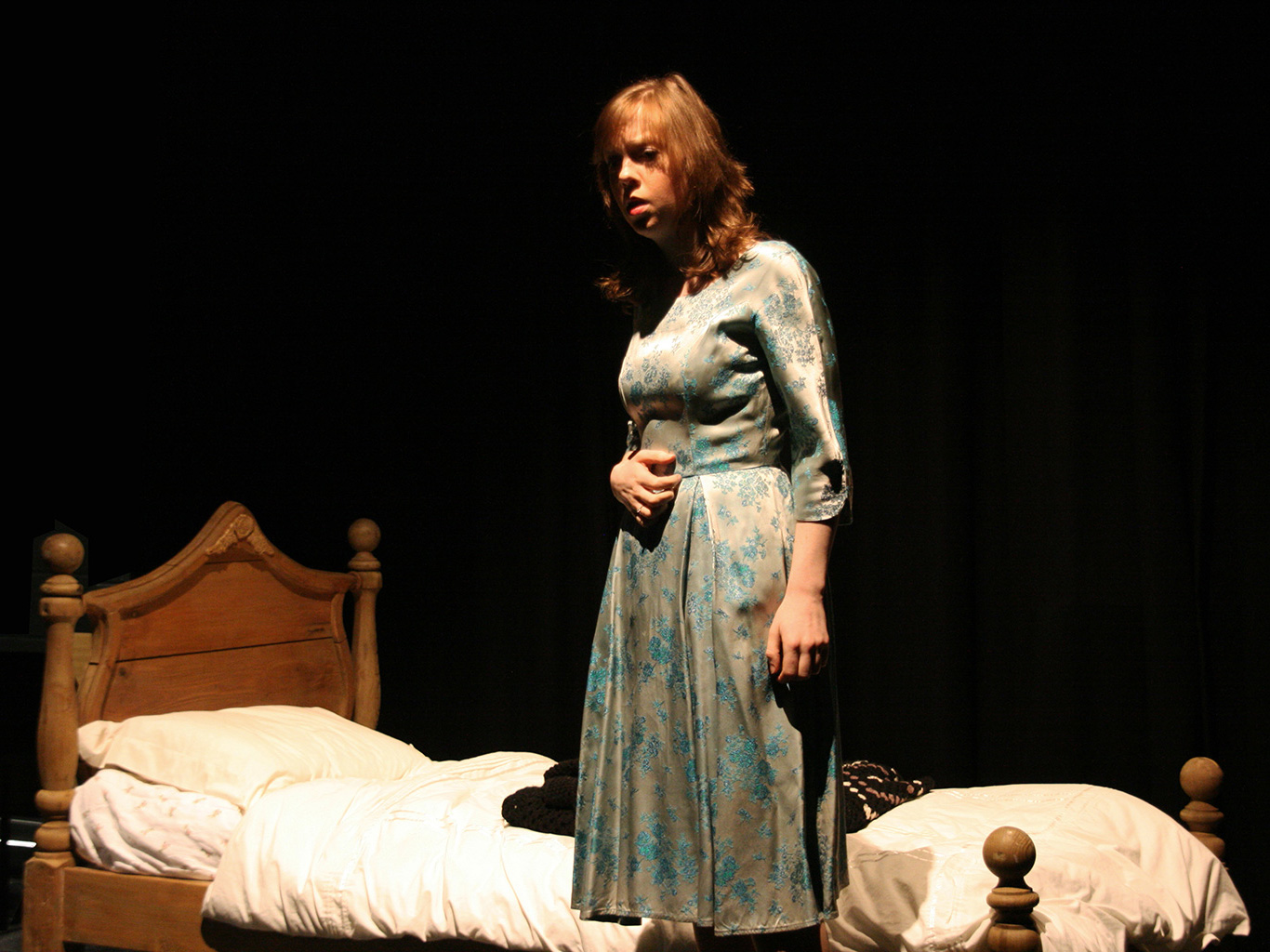Mrs Lazarus
2009, 2012
- Words
- Carol Ann Duffy
- Composer
- Tim Benjamin
- Director (2009)
- Lewis Reynolds
- Director and designer (2012)
- Katherine Wilde

2009, 2012
A woman's husband dies.
She gradually forgets him; but just she feels ready to love again...
He returns, zombie-like, from the dead, to haunt her and taunt her.
“He lived...”
Taking place in the mind of a grieving woman, and dramatised for this one-act opera, Carol Ann Duffy's Mrs Lazarus vividly recounts the grieving process.
A woman's husband gradually fades from her memory, and we are taken through the stages of grief: first, a visceral reaction (howling, shrieking); then the practical matter of dealing with his possessions; and finally the physical evidence fades (his hair, his scent), until all that is left is the cold, hard "zero" of her wedding ring. So far, this is told in the past tense - a sequence of memories.
But then the tense shifts to the present. The woman, faithful "for as long as it took", is now ready to move on to a new lover. The images are of fresh air, night, and a hare “thumping” from a hedge: suggestive, delicately, of a new coupling. As soon as this happens, all too swiftly the memory of her husband (not only, but also the mother-in-law and her “crazy song”!) comes roaring back to catch her in flagrante delicto, to fill her with guilt and shame.
The connection to the Biblical Lazarus (risen from the dead after four days) is a reflection that the story is undoubtedly universal: rather than Jesus performing miracles, our own psyches will bring back the dead at the least expected times.
First programmed by Radius alongside Berg's Piano Sonata (1908) and Schoenberg's Chamber Symphony (1906), this intense one act opera is rich with the Expressionism of 1900s Vienna, bringing to mind both the music and subject of Schoenberg's Erwartung (1909).
“Radius was on top form ... by turns exuberantly eloquent and eloquently exuberant. Mrs Lazarus certainly deserves to rise again”
Classical Music
Tim Benjamin's Radius ensemble comprises some of Britains most decorated young new music performers, and since its début in 2007 the group has become known for its polished recitals of contemporary and 20th-century repertoire. For their latest Purcell Room appearance, Radius flanked a major new piece by Benjamin, Mrs Lazarus, with early works by Berg and Schoenberg, drawing together old and new incarnations of expressionism.
Mrs Lazarus is a setting of Carol Ann Duffy's poem, the story of a widow haunted by her dead husband as she seeks solace with a new lover. Benjamin is making a speciality of semi-staged music theatre works, and Mrs Lazarus - directed by Lewis Reynolds - was a particularly successful example. The staging was extremely light, with piano, violin, cello, flute and clarinet placed in a square around the soprano, Danae Eleni, who had a license to move as she wished. I was especially struck by the instrumental prologue, which seemed to encage the vocalist before she had even had a chance to sing. Some of the coloristic effects recalled horror movie soundtracks, and the overall impression remained suitably spooky. At the crucial point where the poem shifts from past to present tense Benjamin's fluid writing locked into tense, even phrases, like becoming suddenly aware of ones own breath.
— Tim Rutherford-Johnson / Musical Opinion
Radius was on top form for its Purcell Room outing last October, by turns exuberantly eloquent and eloquently exuberant ... their world premiere reading of Benjamin’s Mrs Lazarus spoke volumes for the combined imaginative powers of composer and performers, the former responding with carefully calculated restraint in his setting of Carol Ann Duffy's eponymous poem.
Soprano Danae Eleni, subtle in her shading of words and always alive to the poet's song of mourning and memory, revealed the rich theatrical component of Benjamin’s score as an ensemble player, holding the stage persuasively as soloist without parting from her colleagues in the band. Mrs Lazarus certainly deserves to rise again.
— Classical Music
Mrs Lazarus was co-produced in 2012 with Re:Sound for the New Music: North West festival that year.